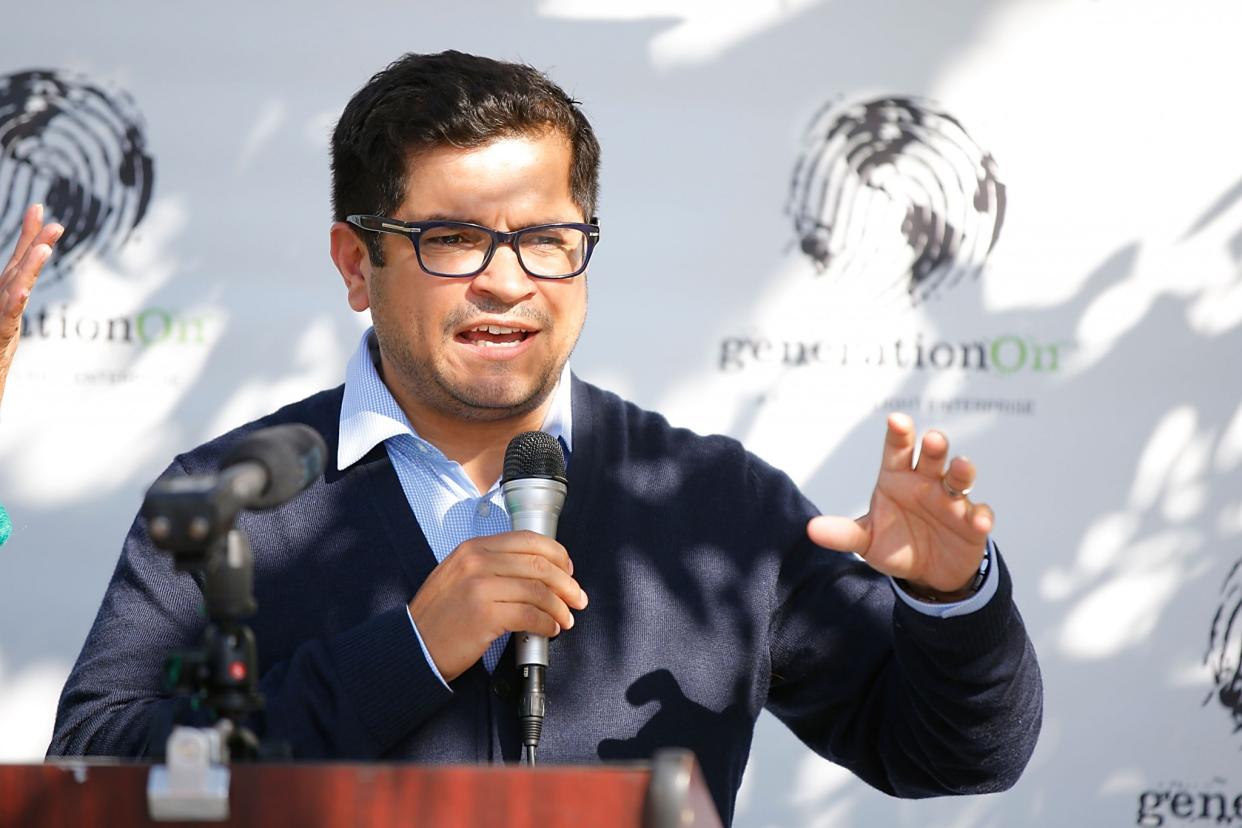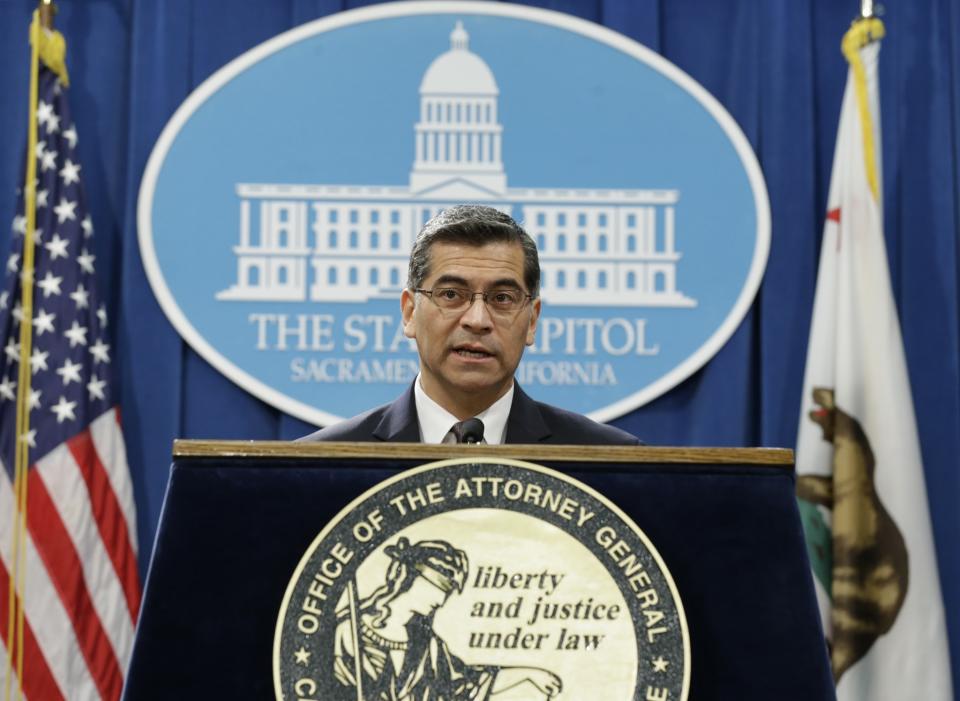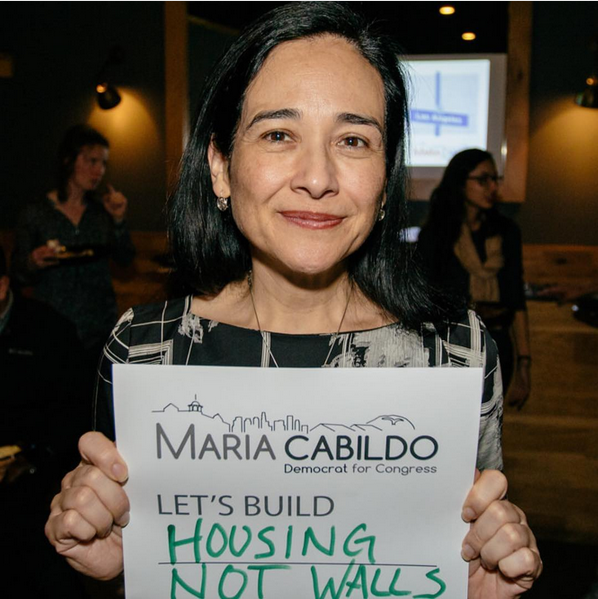How this L.A. House district’s special election could mark a new direction for Democrats

Of all the special congressional elections set to take place over the next few months — the first big electoral battles of the Trump era — the least competitive, in a partisan sense, is the one to replace former Democratic Rep. Xavier Becerra, who became California’s attorney general in January.
That’s largely because of how California runs its primaries: jungle style, with candidates of all parties competing to win 50 percent of the vote in an initial round of balloting, followed by a runoff between the top two finishers — again, regardless of party label — if no one manages to clear that threshold.
As a result, the April 4 primary in California’s 34th Congressional District — a longtime Democratic stronghold in northeastern L.A. — has attracted 23 (yes, 23) candidates. Nineteen of them are Democrats. One is a member of the Green Party. One is a Libertarian. One has no party affiliation.
Only one is a Republican.
So, yes, CA-34 is probably going to be the least “competitive” of the upcoming special elections. But it may also be the most fascinating — especially when it comes to the fight for the future of the Democratic Party.
Political reporters have been trying for weeks to impose some sort of national narrative on the race. Politico’s David Siders sees it a “test” of the so-called resistance, where “the basic issue is if people will take their increased interest in politics and convert that to the more mundane act of voting,” as California data guru Paul Mitchell explained in Siders’ story. For Christine Mai-Duc of the Los Angeles Times, meanwhile, the CA-34 race is all about Sen. Bernie Sanders, I-Vt. — a preview of “how ‘Berniecrats’ can affect future Democratic races across the country.”
There’s truth to both these theories. Sanders narrowly won the district in the 2016 Democratic presidential primary, and at least three candidates say the firebrand populist lawmaker inspired them to run. It also will be interesting to see if antipathy toward President Trump and his agenda inspires more Angelenos to turn out.
But ultimately, voter participation is likely to be dismal — perhaps in the single digits, according to the campaigns and outside observers — and ideological differences probably won’t decide the race. (Nearly all of the Democratic candidates are true-blue progressives.)

The real question that CA-34 will address — and may, at least in part, answer — is both simpler and more fundamental to the future of the party: Will the establishment decide that future? Or, in the Age of Trump, can outsiders and newcomers elbow their way in?
Of all 19 Democrats running to replace Becerra, only one — Jimmy Gomez — is what you might call a traditional politician. The son of Mexican immigrants, Gomez, 42, graduated from Harvard University and served as both a teacher and a union official before winning a seat in the California State Assembly in 2012.
The rest of the field is basically politician-free.
This is a unique situation. Because of the jungle primary system and the district’s safely progressive slant, 18 Democrats who’ve either never held office or never even run before have decided to try their luck and see if they can force a June 6 runoff — at which point all bets will be off (or so the thinking goes).
At a time when national Democrats are despairing over the state of the party and worrying about whether they have the bench of candidates necessary to rebuild — Republicans now control 33 governor’s mansions and 32 statehouses, as well as the presidency and Congress — various activist organizations have been working to persuade members of the newly riled-up, anti-Trump left to run for office. Emily’s List, VoteRunLead and the Center for American Women and Politics are recruiting and training women; Run for Something is recruiting and training millennials; and 314 Action is recruiting and training scientists.
“In the week since we’ve kicked off, more than 1,200 people have said they’re not willing to stay quiet,” Run for Something founder Amanda Litman, a former email director for Hillary Clinton, said in January. “They want to step up and lead the resistance by not just showing up at the polls or at the protests, but by being on the ballot.”
The special election in CA-34 is the first — and, so far, the best — test of whether this strategy could actually pay off. Of the 23 candidates, a majority are women. At least 16 are Hispanic. (The district itself is 65 percent Hispanic.) Half have their own immigration stories. Thirteen are in their 20s or 30s.
There’s a labor activist, former journalist and radio personality who was an early Sanders supporter and spent several weeks at the Dakota Access Pipeline protest (Wendy Carrillo, 36).
There’s a former Obama White House staffer who was raised on welfare, graduated from Harvard’s Kennedy School of Government, modeled for Maxim and recently learned that she has a genetic mutation that means she is extremely likely to develop breast cancer (Alejandra Campoverdi, 37).
There’s a longtime Boyle Heights activist who, as the daughter of immigrants, helped co-found the East Los Angeles Community Corp., a nonprofit focused on economic development and housing (Maria Cabildo, 49).
There’s a former deputy political director for Sanders’ presidential campaign who lived in Mexico as a child and most recently worked for Latino digital startup network Mitú (Arturo Carmona, 38).
There’s a former downtown director for L.A. City Councilman José Huizar who worked for a time as a teacher and launched a nonprofit that helps students obtain scholarships to elite private schools (Sara Hernandez, 33).
There’s even a rocket scientist: Tracy Van Houten, 34, who worked on the Mars Curiosity rover as an aerospace engineer at the Jet Propulsion Laboratory in La Ca?ada Flintridge, but accelerated her plan to enter politics after Trump was elected.
And the list of newcomers and outsiders goes on.
“You need to have a seat at the table,” Van Houten recently told the Atlantic. “The only way we’ll change Washington is if we change the people who we send there.”

Right now, Gomez, the assemblyman, has most of the traditional advantages. His most recent filing with the Federal Election Commission shows him leading the field in fundraising (as of Dec. 31), with a total haul of $301,493 — including $292,935 cash on hand. And the race for endorsements isn’t even close. In addition to key local and national Hispanic leaders — including California Reps. Grace F. Napolitano, Pete Aguilar and Juan C. Vargas, Texas Rep. Filemon Vela and Arizona Rep. Ruben Gallego — Gomez has locked down the support of pretty much every establishment figure and organization in California: the state Democratic Party, the major labor unions, state Senate leader Kevin de León, Assembly Speaker Anthony Rendon, L.A. County Supervisor Hilda Solis, recently reelected L.A. Mayor Eric Garcetti, Sen. Kamala Harris and even Becerra himself.
But Gomez’s rivals aren’t clearing the way for a coronation. The Los Angeles Times has endorsed Cabildo, calling her “a new kind of candidate for a new kind of Democratic Party.” Hernandez raised an impressive $200,232 during her first two weeks in the race, ending 2016 with $194,214 in the bank; she’s one of the few candidates airing ads on TV. Campoverdi is also well funded, and also up on the air. A January Latino Decisions poll found Carmona with the highest favorability ratings of the bunch, at 73 percent, and a narrow lead over Gomez. And a less formal (but more recent) survey showed former Los Angeles school board member Yolie Flores, 54, with significant support in the district.
Because so many candidates are competing, and because everyone’s name recognition is relatively low, experts don’t expect Gomez to hit the 50 percent mark, which means there’s likely to be a two-person runoff in June. It’s possible that the race’s sole Republican — William “Rodriguez” Morrison, 54, an apartment building manager and perennial vanity candidate who has also run for L.A. City Council, the state Senate and L.A. mayor — could squeak through with unified support from the district’s tiny GOP minority. But it’s also possible that one of Gomez’s fellow Democrats will finish in second place, setting up a much higher profile — and much more direct — confrontation between the old guard and the new two months later.
At a recent fundraiser, Carmona, the former Sanders campaign staffer, railed against “machine politics” and accused party insiders of picking favorites. “According to them, this race is over,” he told the crowd. “But we’re going to surprise them.”
Whether it’s Carmona who earns that opportunity — or someone else — remains to be seen. But with low turnout, a sprawling field and lots of left-wing voters, it’s hard to imagine a better place or time for him and his fellow outsiders to prove that they can win elections.
Read more from Yahoo News:


